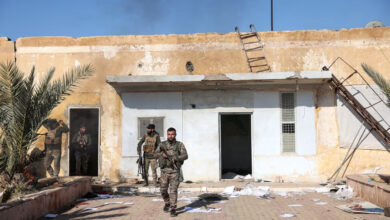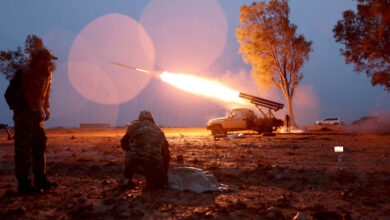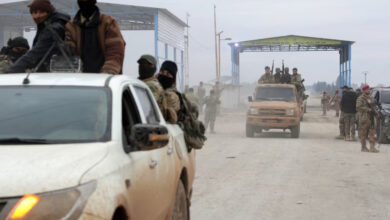
Syrian opposition forces claim to have taken control of Daraa city in southwestern Syria, inching closer to the capital Damascus.
The rebels are now battling Syrian President Bashar al-Assad’s forces from two directions; the north and the south, in an attempt to close in on Damascus. Daraa is where the Syrian uprising started in 2011. The Syrian Defense Ministry has not yet confirmed or denied that rebels are in control of Daraa.
“Our forces have taken full control of the entire city of Daraa and have started combing through its neighborhoods and securing its institutions and government offices,” local rebel fighters known as the Southern Operations Room said in a statement late Friday.
A video, geolocated by CNN, shows rebels outside the Daraa administrative building.
The southern factions are different from factions in the north led by the Islamist rebel group Hayat Tahrir al-Sham (HTS), who have already taken two major cities during their offensive that started over a week ago. Still, those groups aim for the same goal, which is toppling Assad.
The offensive has reawakened a civil war that had been largely dormant for years. The conflict began in 2011, after Assad moved to stamp out peaceful pro-democracy protests during the Arab Spring. The fighting swelled as other regional actors and world powers – from Saudi Arabia and the United States to Iran and Russia – piled in, escalating the civil war into what some observers described as a “proxy war.”
More than 300,000 civilians have been killed in more than a decade of war, according to the United Nations, with millions more displaced across the region.
On Friday, rebels in southern Syria also took control of a Syria-Jordan border crossing, after launching a fresh offensive. The Nassib border crossing marks the southernmost point of the major M5 highway, which runs from the northern city of Aleppo and through the capital. In a video geolocated by CNN, armed fighters were seen marching down a road by the Nassib border crossing, after wresting it from government control.
The rebels in the north, after capturing Aleppo a week ago, have pushed south along the highway and on Thursday took the city of Hama. They have now set their sights on Homs.
And as anti-regime offensives gather pace both to the north and south of the capital Damascus, Kurdish-led fighters say they have moved into eastern parts of Syria.
Kurdish forces occupy the northeast of the country, having achieved hard-won autonomy during a decade of civil war. They fear that autonomy could now be under threat by the Syrian opposition insurgents. Although the stated target of the rebel offensive is the Assad regime, Kurdish fighters have said they fear the violence could spill over into their territory.
Fear of Retaliation
Hundreds of people appear to have fled the central Syrian city of Homs overnight into Friday. Videos showed hundreds of vehicles lining the highway out of Homs, as the city braces for violence.
After capturing the city of Hama to the north on Thursday, the rebels set their sights on the crossroads city of Homs which, if captured, would split the territory under the control of the regime in two.
“From here we direct the last call to the regime forces, this is your chance to defect,” said the Military Operations Media of the armed opposition groups led by HTS, in a statement.
Late on Friday, the rebels claimed to have seized the last village on the outskirts of Homs city, saying they are at the city walls.
The goal of Syria’s rebel coalition, which has wrested two major cities from government control in just over a week, is ultimately to overthrow the decades-old Assad regime, the militant leader of HTS, Abu Mohammad al-Jolani, told CNN in an exclusive interview on Thursday.
“When we talk about objectives, the goal of the revolution remains the overthrow of this regime. It is our right to use all available means to achieve that goal,” said Jolani.
Homs has a sizeable population of Alawites, co-religionists of Assad, many of whom fear retribution from rebels who accuse Alawites of dominating the country and supporting Assad’s quashing of the rebellion.
After bursting out of their pocket of territory in the northwest region of Idlib, the rebels captured Aleppo within three days and Hama within eight, meeting minimal resistance from regime forces which were caught flat-footed by the lightning offensive.
It is not clear whether regime forces will be able to defend the city of Homs, about an hour’s drive south of Hama.
CNN was unable to reach multiple contacts in Homs on Friday, amid reports of an internet blackout as the rebels approached the city.
The rebels’ progress has been met with celebration from many residents of the newly captured cities who had lived under regime rule for years. Videos geolocated by CNN showed rebel fighters cheering – almost in disbelief at their progress – as they entered Hama.
“Guys, my country is being liberated. I swear to God, we are inside Hama city, we are inside Aleppo city,” a fighter cheered as he filmed himself by Alaarbaen Roundabout in Hama.
The rebels led by HTS said they freed hundreds of those “wrongfully detained” from Hama’s central prison. The city was the site of one of Syria’s largest massacres in 1982, when President Hafez al-Assad – the current ruler’s father – ordered his military to quash a revolt.

In an interview with CNN, Jolani, the leader of HTS, said his group aimed to create a government based on institutions and a “council chosen by the people.”
Although the prospect of the rapid collapse of the Assad regime was scarcely conceivable just over a week ago, Jolani said: “The seeds of the regime’s defeat have always been within it… the Iranians attempted to revive the regime, buying it time, and later the Russians also tried to prop it up. But the truth remains: this regime is dead.”
Regional Concerns
The foreign ministers of Iran, Iraq, and Syria met in Baghdad Friday and said in a joint statement that the advance of opposition forces in Syria poses “a serious danger to the three countries, threatens the security of their peoples and the region as a whole.”
The three countries described the Syrian armed opposition forces as “terrorists,” stressing that there was “a need for collective action to confront it.”
Israel has instructed its forces “to maintain a high level of preparedness and to continuously monitor the developments,” in Syria as rebels advance, the country’s defense ministry said in a statement Friday.
The Israeli military “is prepared for any scenario and is determined to protect the citizens of Israel and protect Israel’s security interests at all times,” the statement said.
The US on Friday urged its citizens to depart Syria “now while commercial options remain available in Damascus.”
“U.S. citizens who choose not to depart Syria or are unable to depart should prepare contingency plans for emergency situations and be prepared to shelter in place for extended periods. The Aleppo International Airport is closed,” the State Department said in a statement, citing the “volatile and unpredictable” security situation.
CNN’s Lauren Izso and Avery Schmitz contributed to this report




